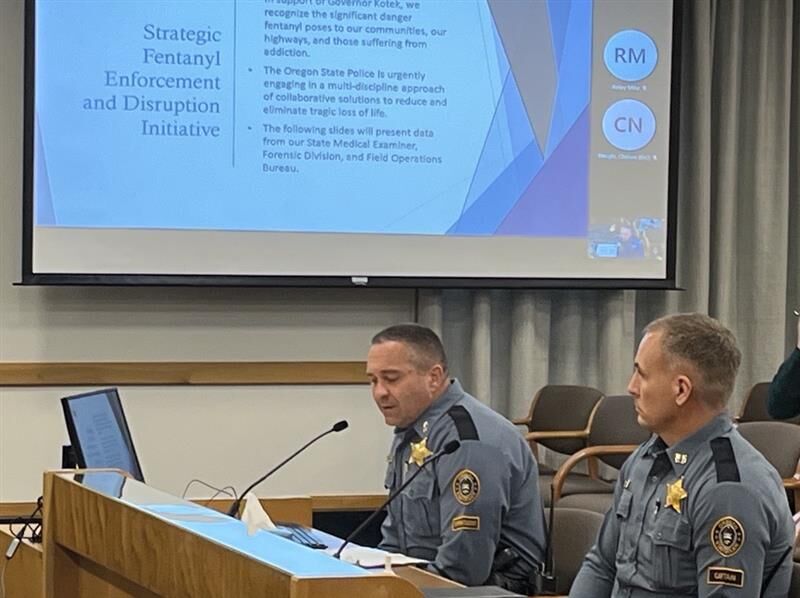Police, prosecutors seek changes in voter-approved drug law
Published 9:40 am Tuesday, November 7, 2023

- Superintendent Casey Codding of the Oregon State Police, left, speaks about his agency’s efforts against fentanyl, a synthetic opioid more potent than heroin, during a joint legislative committee meeting on Monday, Nov. 6, in Salem. Capt. Kyle Kennedy is seated next to Codding.
Police and prosecutors urged state lawmakers to bar public drug use and reinstate criminal penalties for possession of small amounts of specified drugs, which Oregon voters ended in passing a 2020 ballot measure.
They also want the Legislature to reverse a recent decision by the Oregon Supreme Court, which held on Oct. 5 that mere possession of a large quantity of drugs is insufficient to prove an “attempted transfer” that carries greater criminal penalties under state law.
But all of the law enforcement officials who appeared Monday, Nov. 6, told a legislative committee they are not seeking a full repeal of the ballot initiative, which also channels most state taxes on marijuana sales into treatment programs for substance use. Measure 110 passed with a majority of 58%.
“I want to state clearly that addiction and mental health concerns are health issues,” Portland police Sgt. Aaron Schmautz said. “We cannot and should not attempt to arrest our way out of this issue.”
Schmautz also is president of the Portland Police Association, which represents Portland Police Bureau officers. He has returned from a 10-day visit to Portugal, where drug addiction is considered a public health issue. Schmautz said that nation, unlike Oregon and other states, has not experienced the negative effects of fentanyl, a synthetic opioid that is far more potent than illegal heroin.
“Fentanyl is a deal-changer,” he said. “It is a different environment than we have ever experienced.”
It was law enforcement’s turn before the joint committee, which heard from local treatment providers and state officials at its first meeting Oct. 18.
Changes are sought
Four organizations — Oregon Association of Chiefs of Police, Oregon State Sheriffs Association, Oregon District Attorneys Association and the League of Oregon Cities — say they back at least two changes to Measure 110. One would ban public drug use — drinking alcohol and smoking marijuana in public already are banned — and another would reinstate criminal penalties for possession of small amounts of cocaine, fentanyl, heroin, MDMA, methamphetamine and nonprescribed oxycodone.
Measure 110 made such possession punishable only as a Class E violation with a maximum fine of $100, which can be waived if someone agrees to a drug evaluation. The proposed change would make possession a Class A misdemeanor, punishable by a maximum 364 days in jail — one day short of state prison — and a fine of $6,250.
“You will note that I said changes, not a full repeal,” Schmautz said. “My membership feels strongly that we need to navigate the world we are in. We have some concerns about thrusting police officers right back into the middle of this conversation” if criminal penalties for possession are reimposed.
“Anything that we do needs to be centered on treatment and diversion,” he added. “We need to make sure that people are getting the help as it relates to people who are using narcotics… The only options police officers have now are walking away or jail — and those are just not sufficient.”
Though police should regain authority to arrest people and charge them with crimes for possession of small amounts, Schmautz acknowledged that such a move would worsen Oregon’s shortage of lawyers for representation of indigent criminal defendants. The shortage already has resulted in the release of defendants, particularly in Multnomah and Washington counties, and a Nov. 2 order by Judge Michael McShane in U.S. District Court that lawyers must be appointed within seven days or sheriffs must release defendants from custody. Both state and federal constitutions guarantee a right to counsel in most criminal cases.
Although Republican legislators have called for a special session to refer a repeal measure to voters — including Rep. Christine Goodwin of Roseburg, who is running for an Oregon Senate seat — the committee is led by Democrats, both former deputy district attorneys. They seek a balanced approach in writing legislation for the 35-day 2024 session, which starts Feb. 5.
Even Senate Republican Leader Tim Knopp of Bend, who called Measure 110 “a massive failure,” said he preferred legislative action to a ballot measure that would have to await the 2024 general election on Nov. 5.
A coalition of business and law enforcement organizations has filed four potential ballot initiatives for the 2024 general election, but none has advanced to the stage of obtaining 1,000 voter signatures for the attorney general to write a ballot title, or official summary. Any of them will need 111,173 signatures to qualify for the ballot; the initial 1,000 signatures would count toward the total.
Fentanyl is widespread
Hermiston Police Chief Jason Edmiston said the pervasiveness of fentanyl is not limited to Portland. He said that his agency, plus the regional fire and medical services agency, have had to administer the drug that reverses opioid overdoses 57 times so far this year — an increase of 57% from the 2020 level.
“Every community is experiencing the impact of the crisis we face,” he said.
Unlike others who testified, Edmiston said he does lay part of the blame on passage of Measure 110. He said any legislative changes should include some way to compel people to enter treatment for substance use, though experts are divided over whether such a mandate is effective.
“I believe the passage of Measure 110 significantly diminished our role and the tools our officers have available to help those who are suffering from addiction,” he said.
“We also believe that a system that lacks a way to compel people with addictions to enter treatment will make those investments ineffective. But as I say this, I do not believe a return to incarceration is the answer.”
Superintendent Casey Codding said the Oregon State Police has begun an effort aimed specifically at fentanyl, and some of those efforts are in cooperation with the Portland Police Bureau under an initiative directed by Gov. Tina Kotek. State Police troopers have been present on the streets of Old Town — largely by bicycle patrols — and a detective has been assigned to work with Portland officers.
“We are disrupting the delivery system,” he said.
Fentanyl seizures statewide, according to OSP figures, were 106 pounds in 2021, 170 pounds in 2022, and an equal amount so far with two months left in 2023.
More dramatically, Codding said, OSP urinalysis tests for suspected drunken drivers turned up only 14 instances of fentanyl in 2013-15 — likely from legitimate medications — but was detected in 200 of 1,476 tests in 2022.
Among others who testified were Lincoln County Sheriff Curtis Landers, Salem Police detective Scotty Nowning and Umatilla County District Attorney Dan Primus, who also is president of the Oregon District Attorneys Association.
District attorneys have proposed legislation to re-establish the legal standard for possession of a large quantity of specified drugs with intent to deliver as sufficient to prove an attempted transfer as a crime under a 1977 state law. The Oregon Court of Appeals set that as the standard in a 1988 case. But in September 2021 — in a case stemming from a 2018 arrest in Tigard — the appeals court ruled that it was a “substantial step,” yet insufficient to prove an attempted transfer. The Oregon Supreme Court upheld that ruling on Oct. 5, but invited lawmakers to clarify the law.
Lawmakers took no action while the case made its way to the Supreme Court. Primus said lawmakers should step in now that the high court has decided it.
“What it does is change that 3-decade-old area of law that we utilized as prosecutors and law enforcement to combat this and hold individuals accountable,” Primus said.





